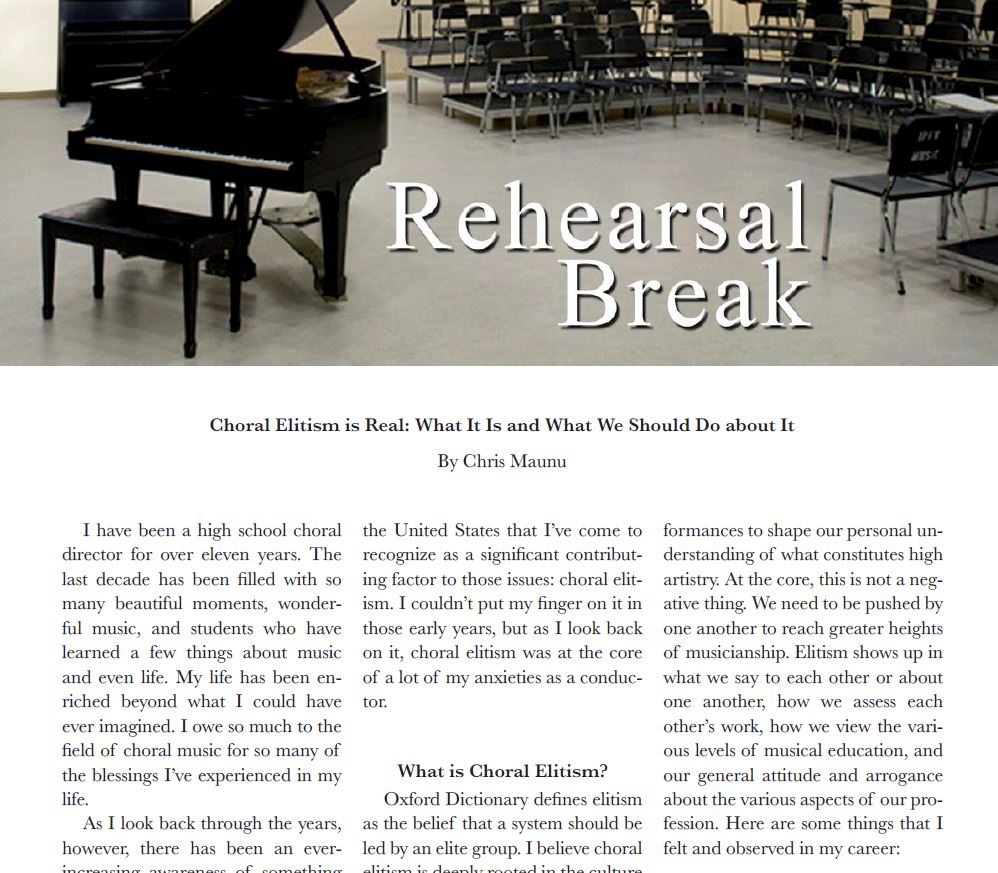
The June/July 2018 issue of Choral Journal features an article titled “Choral Elitism is Real: What It Is and What We Should Do about It” by Chris Maunu. You can read it in its entirety online at acda.org/choraljournal. Click “Search Archives” and choose June/July 2018 from the dropdown menu.
_____________________________
I have been a high school choral director for over eleven years. The last decade has been filled with so many beautiful moments, wonderful music, and students who have learned a few things about music and even life. My life has been enriched beyond what I could have ever imagined. I owe so much to the field of choral music for so many of the blessings I’ve experienced in my life.
As I look back through the years, however, there has been an ever increasing awareness of something else—something that presents itself in a less-than-overt manner. Many of my years have been spent second guessing myself, wondering if I’m good enough, comparing myself to others, and suffering from imposter syndrome. Much of my journey in working to get over that in recent years has involved recognizing my own innate insecurities as a conductor. It even took some time in therapy to get to the heart of something else going on in the choral landscape of the United States that I’ve come to recognize as a significant contributing factor to those issues: choral elitism. I couldn’t put my finger on it in those early years, but as I look back on it, choral elitism was at the core of a lot of my anxieties as a conductor.
What is Choral Elitism?
Oxford Dictionary defines elitism as the belief that a system should be led by an elite group. I believe choral elitism is deeply rooted in the culture of our profession. It stems partially from the comparative aspects of what we do. We can all agree that excellence is valued highly in any artistic medium, but because there is no one universally accepted definition of what a great choir sounds like, the only way we can assess our own level of achievement is by comparing it to other work that has already been presented.
We spend a great deal of time listening to great recordings and performances to shape our personal understanding of what constitutes high artistry. At the core, this is not a negative thing. We need to be pushed by one another to reach greater heights of musicianship. Elitism shows up in what we say to each other or about one another, how we assess each other’s work, how we view the various levels of musical education, and our general attitude and arrogance about the various aspects of our profession. Here are some things that I felt and observed in my career:
“I’m better than you because my choir is performing at this level and your choir is not.”
I’m sure very few have actually come out and said this, but it’s felt in the underpinning of a comment, body language, or facial expression. It’s in a simple statement like, “You’ll get there.”
“If you are not as experienced or your choir isn’t performing at a certain level, you aren’t as valuable to the profession.”
A colleague of mine shared a story about performing at a state conference for the first time. One of her students came up to her and asked, “Are we supposed to be here?” Confused, the conductor inquired what the student was talking about, and he explained, “I overheard someone say we didn’t deserve to be here because you’re such a new teacher.” My colleague was mortified that (a) a music teacher thought that and (b) had the nerve to say it aloud in front of students.
_____________________________
Read the rest of this article (and more!) in the June/July 2018 issue of Choral Journal, available online at acda.org.


Leave a Reply
You must be logged in to post a comment.